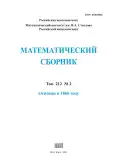Том 212, № 2 (2021)
Фильтрация ветвления и деформации
Аннотация
Пусть $\mathscr K$ – поле формальных рядов Лорана с коэффициентами в конечном поле характеристики $p$, $\mathscr G_{< p}$ – максимальный фактор группы Галуа поля $\mathscr K$ периода $p$ и класса нильпотентности $< p$ и $\{\mathscr G_{< p}^{(v)}\}_{v\geqslant 1}$ – фильтрация подгрупп ветвления в верхней нумерации. Пусть $\mathscr G_{< p}=G(\mathscr L)$ – отождествление нильпотентной теории Артина–Шрайера: здесь $G(\mathscr L)$ – группа, полученная из проконечной $\mathbb{F}_p$-алгебры Ли $\mathscr L$ с помощью группового закона Кемпбелла–Хаусдорфа. В работе изложен новый подход к описанию идеалов $\mathscr L^{(v)}$ таких, что $G(\mathscr L^{(v)})=\mathscr G_{< p}^{(v)}$, и построению их явных образующих. Для заданного $v_0\geqslant 1$ строится эпиморфизм алгебр Ли $\overline\eta^{\dagger }\colon \mathscr L\to \overline{\mathscr L}^{\dagger }$ и действие $\Omega_U$ формальной группы порядка $p$, $\alpha_p=\operatorname{Spec}\mathbb{F}_p[U]$, $U^p=0$, на $\overline{\mathscr L}^{\dagger }$. Пусть $d\Omega_U=B^{\dagger }U$, где $B^{\dagger }\in\operatorname{Diff}\overline{\mathscr L}^{\dagger }$, и $\overline{\mathscr L}^{\dagger }[v_0]$ – идеал в $\overline{\mathscr L}^{\dagger }$, порожденный элементами $B^{\dagger }(\overline{\mathscr L}^{\dagger })$. Основной результат работы утверждает, что $\mathscr L^{(v_0)}=(\overline\eta^{\dagger })^{-1}\overline{\mathscr L}^{\dagger }[v_0]$. В заключительных параграфах этот результат связывается с явным описанием образующих идеала $\mathscr L^{(v_0)}$, полученным ранее автором, и формулируется его более эффективная версия, позволяющая восстанавливать всю фильтрацию ветвления группы $\mathscr G_{< p}$ по множеству ее скачков.
Библиография: 13 названий.
 3-37
3-37


О компактификации носителя решения с задержкой по времени и об исчезновении решения
Аннотация
 38-52
38-52


Полигомоморфизмы локально компактных групп
Аннотация
 53-80
53-80


Топологический анализ биллиарда, ограниченного софокусными квадриками, в потенциальном поле
Аннотация
 81-105
81-105


Операторы мультипликаторного типа и приближение периодических функций одной переменной тригонометрическими полиномами
Аннотация
 106-137
106-137


Максимальные алгебры Ли среди локально нильпотентных дифференцирований
Аннотация
 138-146
138-146











